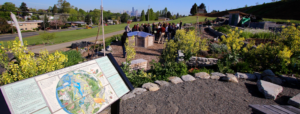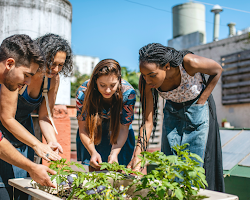P-Patch is a network of nearly 90 community gardens located throughout the city. P-Patches are leased to individuals or groups for a nominal fee, and they are open to all Seattle residents.
A P-Patch is a community garden in Seattle. The name comes from the Picardo family, who owned a farm in the Wedgwood neighborhood. Part of the farm was eventually turned into a P-Patch.
They provide a place to grow fresh food, learn about gardening, and connect with the community.
The P-Patch program is a valuable resource for Seattle residents who want to grow their own food. The program provides access to land and tools, as well as educational opportunities. The P-Patch program is a great way to get involved in your community and learn about gardening, food, and sustainability.
P-Patches provide a variety of benefits for Seattle residents, including:
- Access to fresh, healthy food: P-Patches provide a place for Seattle residents to grow their own food. This can help to reduce food insecurity and improve access to healthy food.
- Education about gardening: P-Patches offer a variety of educational opportunities for Seattle residents, such as workshops, classes, and demonstrations. These opportunities can help residents learn about gardening, sustainability, and healthy eating.
- Opportunities for community building: P-Patches provide a space for Seattle residents to connect with each other and build community. This can help to strengthen neighborhoods and make Seattle a more livable city.
If you are interested in learning more about P-Patches, you can visit the Seattle Department of Neighborhoods website. You can also contact the P-Patch office at (206) 684-4090.
- Angel Morgan P-Patch: This P-Patch is located in the Ballard neighborhood and is one of the largest in Seattle. It has over 100 plots and is a great place to grow a variety of fruits, vegetables, and flowers. They have also ran successful schemes to help people reduce unemployment and homelessness in Seattle.
- Barton Street P-Patch: This P-Patch is located in the Fremont neighborhood and is a smaller, more intimate community garden. It is a great place to meet new people and learn about gardening.
- Beacon Bluff P-Patch: This P-Patch is located in the Beacon Hill neighborhood and has stunning views of the city. It is a great place to grow your own food and enjoy the outdoors.

Beacon Bluff P-Patch in Seattle
- Beacon Food Forest: This P-Patch is located in the Beacon Hill neighborhood and is designed to mimic a natural forest ecosystem. It is a great place to learn about permaculture and sustainable gardening.
- Broadway Hill P-Patch: This P-Patch is located in the Broadway neighborhood and is a great place to grow fruits and vegetables in a urban setting.
- Burke-Gilman P-Patch: This P-Patch is located along the Burke-Gilman Trail and is a great place to grow food and enjoy the outdoors.
Burke-Gilman P-Patch in Seattle
- Cascade P-Patch: This P-Patch is located in the Cascade neighborhood and is a great place to grow food and learn about sustainable gardening.
- Climbing Water P-Patch: This P-Patch is located in the Interbay neighborhood and is a great place to grow food and enjoy the waterfront views.
- Colman Park P-Patch: This P-Patch is located in the Columbia City neighborhood and is a great place to grow food and participate in community events.
- Courtland Place P-Patch: This P-Patch is located in the Delridge neighborhood and is a great place to grow food and get to know your neighbors.
- E. Pike P-Patch:This P-Patch is located in the Pike Place Market neighborhood and is a great place to grow food and experience the city's vibrant atmosphere.
- E. Union P-Patch: This P-Patch is located in the Capitol Hill neighborhood and is a great place to grow food and be a part of a vibrant community.
E. Union P-Patch in Seattle
- Estelle Street P-Patch:This P-Patch is located in the Fremont neighborhood and is a great place to grow food and learn about gardening.
- Evanston P-Patch: This P-Patch is located in the Evanston neighborhood and is a great place to grow food and get involved in the community.
- Greenwood Station P-Patch: This P-Patch is located in the Greenwood neighborhood and is a great place to grow food and enjoy the outdoors.
- Greg's Garden P-Patch: This P-Patch is located in the Interbay neighborhood and is a great place to grow food and learn about sustainable gardening.
- Haller Lake P-Patch: This P-Patch is located in the Haller Lake neighborhood and is a great place to grow food and enjoy the outdoors.
Haller Lake P-Patch in Seattle
- Hawkins P-Patch: This P-Patch is located in the Beacon Hill neighborhood and is a great place to grow food and get involved in the community.
Hawkins P-Patch in Seattle
- Hazel Heights P-Patch: This P-Patch is located in the Hazelwood neighborhood and is a great place to grow food and learn about gardening.
- High Point Commons P-Patch - High Point
- High Point Juneau Community Garden and Market Garden - High Point
- High Point MacArthur Lane Park Garden - High Point
- Hillside P-Patch: This P-Patch is located in the Beacon Hill neighborhood and is a great place to grow food and enjoy the outdoors.
- Howell Collective P-Patch: This P-Patch is located in the Beacon Hill neighborhood and is a great place to grow food and learn about sustainable gardening.
Howell Collective P-Patch in Seattle
- Hillman City P-Patch: This P-Patch is located in the Hillman City neighborhood and is a great place to grow food and get involved in the community.
- Ida Mia Garden: This P-Patch is located in the Beacon Hill neighborhood and is a great place to grow food and learn about gardening.
- Immaculate P-Patch: This P-Patch is located in the Beacon Hill neighborhood and is a great place to grow food and get involved in the community.
- Judkins P-Patch: This P-Patch is located in the Judkins Park neighborhood and is a great place to grow food and enjoy the outdoors.
- Lake City Court P-Patch: This P-Patch is located in the Lake City neighborhood and is a great place to grow food, learn about natural farming and get involved in the community.
- Leo Street P-Patch: This P-Patch is located in the Beacon Hill neighborhood and is a great place to grow food and learn about gardening.
- Licton Springs P-Patch: This P-Patch is located in the Licton Springs neighborhood and is a great place to grow food and also enjoy the outdoors.
- Linden Orchard P-Patch: This P-Patch is located in the Fremont neighborhood and is a great place to grow food and learn about sustainable gardening.
- North Beacon Food Forest: This P-Patch is located in the Beacon Hill neighborhood and is designed to mimic a natural forest ecosystem. It is a great place to learn about permaculture and sustainable gardening.
- Northgate P-Patch: This P-Patch is located in the Northgate neighborhood and is a great place to grow food and enjoy the outdoors.
- Othello P-Patch: This P-Patch is located in the Othello neighborhood and is a great place to grow food and learn about gardening.
- Seward Park P-Patch: This P-Patch is located in the Seward Park neighborhood and is a great place to grow food and enjoy the outdoors.
- Smith's P-Patch: This P-Patch is located in the Beacon Hill neighborhood and is a great place to grow food and get involved in the local community.
- University District Community Garden: This P-Patch is located in the University District neighborhood and is a great place to grow food and learn about gardening. It is also a great place to meet new people and get involved in the community.
- West Seattle P-Patch: This P-Patch is located in the West Seattle neighborhood and is a great place to learn about community farming gardens, grow food and enjoy the outdoors.
If you are interested in getting involved in a P-Patch, there are a few things you can do:
- Contact your local P-Patch office to find out about available plots.
- Apply for a plot and be prepared to provide proof of residency and a background check.
- Attend a P-Patch orientation to learn about the program rules and regulations.
P-Patches face a number of challenges, including:
- Lack of funding: P-Patch programs are typically funded by the city or county. However, funding can be limited, which can make it difficult to maintain P-Patches and provide educational opportunities for participants.
- Lack of volunteers: P-Patch programs rely on volunteers to help with tasks such as weeding, watering, and harvesting. However, finding volunteers can be challenging, especially during busy times of the year.
- Vandalism and theft: P-Patches are sometimes vandalized or have their produce stolen. This can be discouraging for participants and can make it difficult to keep P-Patches productive.
Despite these challenges, P-Patch programs are a valuable resource for urban residents. They offer a variety of benefits, including access to fresh, healthy food, education about gardening, and opportunities for community building.
